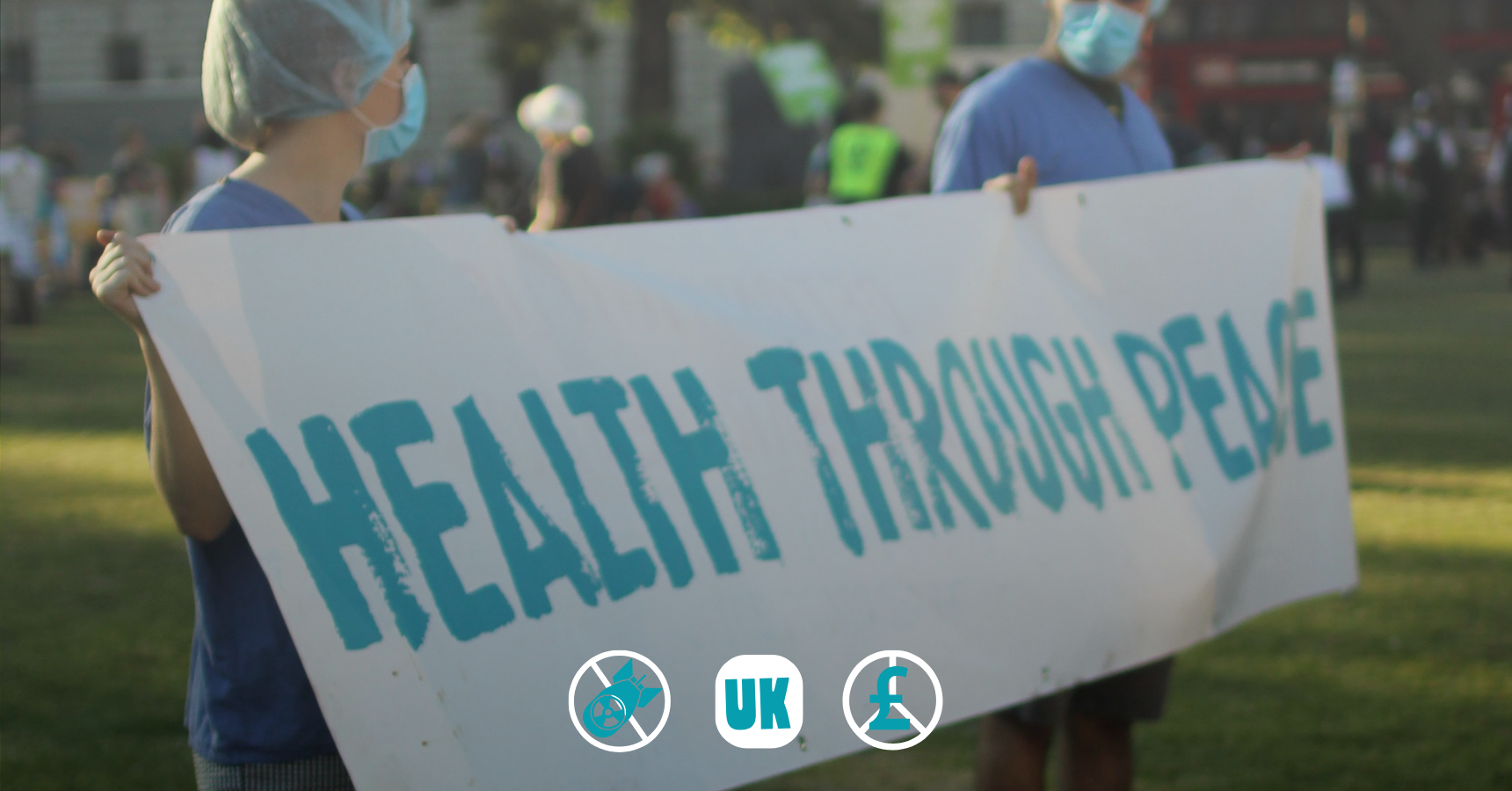
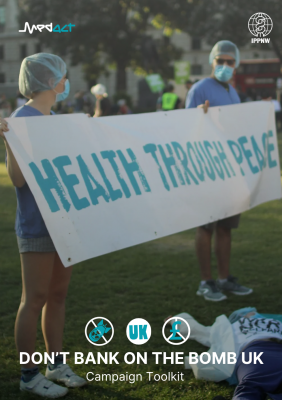
Contents
Introduction
Why Divestment?
Nuclear Disarmament for Health
The United Kingdom’s Nuclear Weapons Arsenal
Key Campaign Targets: Financial Institutions in the UK Funding Nuclear Weapons
How to Write an Ethical Investment Policy Excluding All Investments in Nuclear Weapons
How to Take Action
Endnotes
Author: Zahraa Kapasi, Don’t Bank on The Bomb UK Project Coordinator.
Funding: We are immensely thankful for the generous donation from the late Dr Martin Hartog (1931–2023), a physician valued for his kindness and integrity. Dr Hartog was a co-founder and active member of the Medical Campaign Against Nuclear Weapons (MCANW) until it merged with the Medical Association for the Prevention of War (MAPW) to form Medact in 1992. Dr Hartog served as the first chair of Medact, and remained an active member of the Nuclear Weapons Group until his death in July 2023. Dr Hartog’s generous financial contribution has enabled the staff time and resources to support the launch of the Don’t Bank on The Bomb UK campaign, and this campaign toolkit.
Our Thanks:
We would like to extend our heartfelt thanks to all those who have contributed to the success of Don’t Bank on the Bomb UK: Sarah Lasoye, Michael Orgel, Elizabeth Waterston, Marie-Noelle Vieu, Lorna Mundy, Philip Johnstone, Alejandra Muñoz, Susi Snyder and Steve Hucklesby.
This work builds upon the vital efforts of Pax, ICAN, Don’t Bank on the Bomb Scotland, and Investing in Change.
Introduction
Don’t Bank on the Bomb UK is a grassroots campaign dedicated to ending financial support for the production and development of nuclear weapons.
Every year, the UK government spends billions of pounds on nuclear weapons, contracting private companies, like BAE Systems and Rolls Royce, to maintain and modernise its nuclear arsenal. Many UK financial institutions – including Barclays, Children’s Investment Fund Management and HSBC – still invest heavily in, or provide substantial loans to, companies involved in nuclear weapons.¹
For the health of people and the planet, the elimination of nuclear weapons and prevention of their use is an urgent priority. As a movement for health justice, and through partnerships with civil society organisations, engagement with policymakers, and an active network of supporters, Don’t Bank on the Bomb UK is calling on banks, pension funds and other financial institutions to move their money away from companies building weapons of mass destruction.
This toolkit has been created to empower individuals, communities, and organisations to campaign for divestment from nuclear weapons, and reinforce that funding mass destruction is both morally and socially unacceptable.
By shifting toward ethical and sustainable investments, we can:
- Reduce the financial incentives for nuclear weapons production.
- Support a global movement for disarmament.
- Invest in a future that prioritises health, human security, and environmental sustainability over destruction.
Together, we can dismantle the financial structures that sustain nuclear armament. Through strategic collective action, we can pave the way for global disarmament, demanding a safer, more equitable world.
Why Divestment?
Divestment is an effective strategy for creating social, political, and economic change because it targets the financial underpinnings of harmful industries by cutting off vital access to capital, undermining their ability to operate and grow. By encouraging individuals, institutions, and governments to withdraw investments from specific sectors – in this case nuclear weapons – divestment campaigns apply economic pressure that can drive systemic change.
Divestment campaigns are grounded in moral and ethical arguments, spotlighting industries’ harmful impacts, whilst also challenging their social acceptability. By associating certain investments with unethical practices, divestment campaigns trigger changes in public opinion and lead to individual and collective action. These movements can push companies to reassess their policies
in order to maintain their reputation. In turn, when entire financial institutions divest, they send a strong message – positioning themselves against any ethical alignment to these industries.
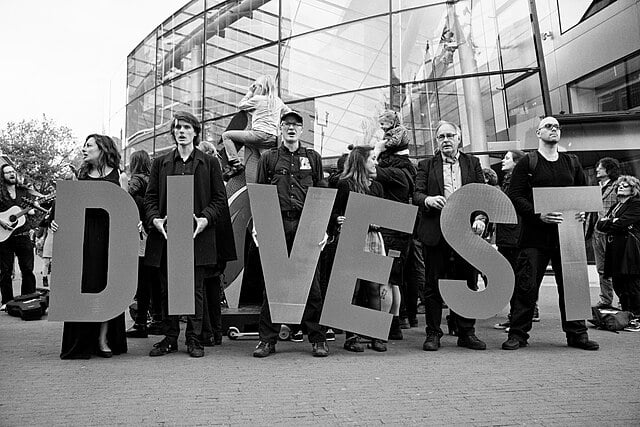
Divestment campaigns have often borne success, proving to be effective tools in pushing through systemic change. In the case of South Africa, the international divestment campaign was a crucial component in ending apartheid. Having established a stronghold on campuses in the United States, the campaign resulted in 155 colleges and universities at least partially divesting in 1988. By 1989 26 states, 22 counties and 90 cities had taken economic action against companies continuing to business in South Africa.² The United States also passed the Comprehensive Anti-Apartheid Act in 1986, which banned new US investment in South Africa.³ Similarly, the fossil fuels divestment movement has seen over $3.4 trillion of assets across over 500
institutions being divested, even receiving divestment commitments from the Rockefeller Brothers Fund, AXA and the British Medical Association.⁴ Furthermore, since the entry into force of the Treaty on the Prohibition of Nuclear Weapons (TPNW) in 2021, and repeated calls for more ethical policies, 78 financial institutions have divested from nuclear weapons, including the Norwegian Sovereign Pension Fund.⁵ These precedents highlight the powerful impact of aligning financial decisions with ethical values to disrupt harmful systems.
In the context of nuclear weapons, divestment not only pressures financial institutions to reconsider their connection to the nuclear weapons industry but also amplifies broader disarmament efforts. It challenges the normalisation of weapons of mass destruction, demands accountability, and reinforces global efforts for a safer and sustainable world.
Nuclear Disarmament for Health6
For the health of people and the planet, the elimination of nuclear weapons and prevention of their use is an urgent priority. A single nuclear explosion would cause unimaginable short and long-term harm to health, to which our health systems could never adequately respond.
Immediate Effects of Nuclear Weapons Use
Following detonation of a nuclear weapon, there is an instantaneous flash of radiation from the exploding nuclear material, and a fireball of extremely hot gas and highly radioactive debris rises to form the mushroom cloud. Temperatures on the ground reach several million degrees centigrade and all human tissue is vaporised. The blast force and incinerating heat causes catastrophic destruction and widespread fires. Super hurricane force winds cause further immense damage. Further away from the blast site, any survivors of the immediate blast will likely die from burns, internal bleeding and injuries caused by flying debris.
Survivors who are exposed to the flash will suffer from acute radiation syndrome with nausea, mental disorientation, internal bleeding, diarrhoea, vomiting and fever – to which there is no specific remedy.
Longer-Term Effects of Nuclear Weapons Use

Radioactive fall-out – the spread of radioactive material across a large area – produces further long-term threats to human life, contaminating waterways, land and food. If radioactive particles are inhaled or swallowed, internal radiation to the body can cause harm and even death, principally from cancers but also from cardiovascular disease.
Radiation is also known to cause harmful long-term genetic changes, and intergenerational psychological impacts. Even after 50 years, survivors of Hiroshima and Nagasaki had significant post-traumatic stress disorders; with some also suffering from the effects of forced migration and social stigmatisation.
We know that use of less than 1% of the world’s nuclear weapons is predicted to cause global climate disruption and widespread famine.
Nuclear famine refers to the impact of the dust and soot thrown up into the atmosphere following a nuclear detonation. Research has found that nuclear war between India and Pakistan, involving about 1.5% of the world’s total stockpile, would dim the sunlight for months or years, shorten growing seasons and reduce global food production – resulting in the death of over 2 billion people from starvation.7
As a movement for health justice, our campaigning towards nuclear disarmament is essential to our efforts to achieve a truly safe, secure and healthy society.
The United Kingdom’s Nuclear Weapons Arsenal
The United Kingdom’s nuclear weapons arsenal holds a stockpile of 225 warheads of which 120 are operationally available for deployment on four Vanguard submarines, each capable of carrying Trident II D5 ballistic missiles.8 The arsenal is set to be modernised, with the Vanguard submarines being replaced by Dreadnought class ballistic missile submarines by the early 2030s, at an estimated cost of £31 billion.9 BAE Systems and Rolls Royce are the UK Government’s main industrial partners, having been awarded contracts worth £2 billion.10 Furthermore, the modernisation of the deterrent will also include increasing the stockpile cap to 260 warheads.11
Military Nuclear Facilities12
| Site | Role | Status |
| Aldermaston (Berkshire) – Atomic Weapons Establishment | Warhead design and maintenance | Active |
| Burghfield (Berkshire) – Atomic Weapons Establishment | Warhead assembly | Active |
| Devonport (Plymouth) | Naval base – maintenance and refitting of nuclear-powered submarines | Active |
| Faslane (Scotland) | Submarine base for the four Vanguard submarines | Active |
| Coulport (Scotland) – Royal Naval Armament Depot | UK Strategic Weapon Facility – storage of warheads before being fitted to Trident missiles | Active |
| Barrow-in-Furness (Cumbria) – BAE Systems | Design and building of nuclear-armed submarines | Active |
| Raynesway (Derby) – Rolls Royce | Propulsion system design and production for nuclear armed systems | Active |
| Orford Ness (Suffolk) | Early nuclear weapon research (Cold War) | Decommissioned |
| Sellafield (Cumbria) | Produced plutonium for the UK’s first nuclear bomb | Active for decommissioning and waste storage |
The Cost: Financial
The Treaty on the Prohibition of Nuclear Weapons (TPNW) entered into force on 22nd January 2021, marking a significant milestone in attaining global nuclear disarmament. With 93 signatories and 73 state parties,13 the treaty is the first legally binding international agreement – banning the development, testing, production, stockpiling, use, and threat of use of nuclear weapons.14
Much progress has come in response to the TPNW and nuclear weapons being made explicitly illegal under this international legal framework. Major financial institutions, including the Norwegian Government Pension Fund,15 KBC Bank16 and Deutsche Bank,17 have divested their investments from nuclear weapons producers, the global demand for disarmament is gaining momentum, and, due to the political and legal pressure created by the treaty, nuclear weapon states, like the United Kingdom, are being forced to defend their nuclear position. Nevertheless, investments into the nuclear weapons industry continue to pour in.
Although direct comparisons of in-service costs are no longer possible due to the UK Government’s 2023 decision to absorb nuclear related expenditure into the Ministry of Defence budget,18 figures produced by the Nuclear Information Service show the United Kingdom’s spending on its nuclear weapons amounted to £6.5 billion in 2022/23 – a 17% increase from the previous year.19
With the constant increase in military expenditure year after year,20 the recent Labour policy shift announcing the biggest increase in defence spending since the Cold War,21 Trident costing £12,000 a minute,22 and spending on nuclear programmes between 2022 and 2033 forecast at £128 billion, the sheer financial burden of the United Kingdom’s nuclear arsenal is staggering.23
The Cost: Social
Whilst the increase in spending has been justified through the lens of militarised security, often citing the wars and conflicts the defence firms of Europe and the United States have profited from, discussions on nuclear weapons must also consider human security, and the financial and social impacts.
Human security encompasses social welfare and infrastructure such as healthcare, education, housing and climate resilience – all aspects of society in dire need of additional funding in the United Kingdom.
A lack of NHS funding is causing huge strains on healthcare services,24 30% of children in the UK live in poverty,25 the number of people sleeping rough has increased by 91% since 2021, with 164,040 children in temporary accommodation,26 more than 3.1 million emergency food parcels were distributed by the Trussell food banks alone between 2023 and 2024,27 and yet significant welfare cuts continue to be announced.28 Meanwhile the United Kingdom’s defence budget is set to increase to 2.5% of GDP.29
The vast sums invested into the nuclear deterrence system, rather than such vital and underfunded services, contributes to widening inequalities, weakening public services, and undermining efforts to address urgent global challenges like climate change and poverty.
Transferring a fraction of the costs of the United Kingdom’s ten year programme for its nuclear deterrent would enable the NHS to honour its commitment to its hospital rebuilding project, which is estimated to cost at least £30 billion.30 The £6.5 billion spent on the United Kingdom’s nuclear programme in 2022/23 could pay the salaries of 169,650 nurses or 59,150 consultants.31
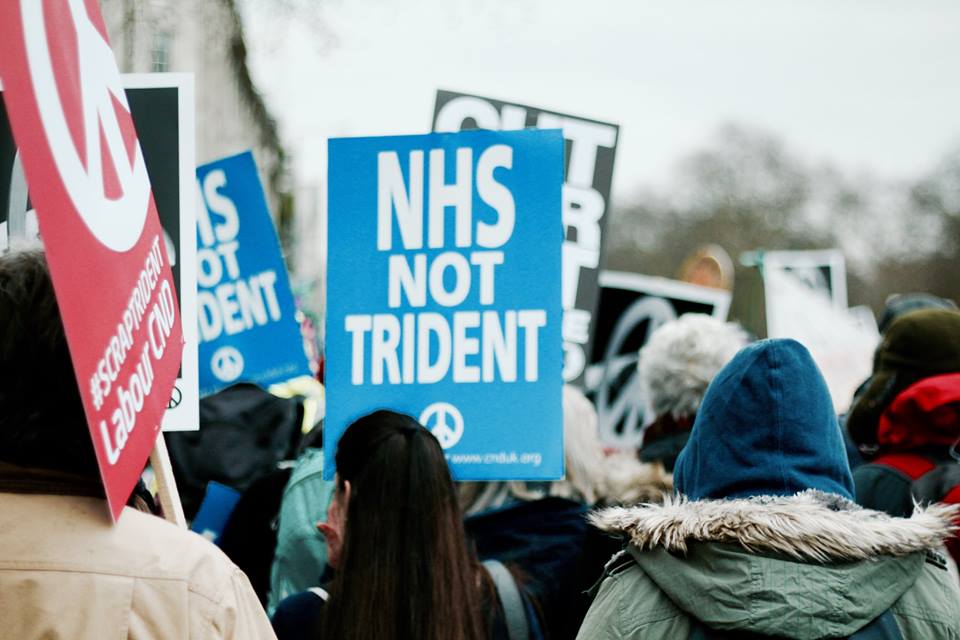
In addition, £5 billion a year over the next five years would enable the building of 72,000 additional social and affordable houses a year.32
In the throes of a cost-of-living crisis and growing economic insecurity, the justification for increasing nuclear weapons spending must be critically examined. Rather than reinforcing a militarised approach to security, campaigns for nuclear disarmament must engage with broader societal impacts. We must work to make clear that nuclear deterrence does not contribute to our safety or security. In fact, a world where nuclear weapons continue to exist, and proliferate, is a world increasingly at risk of catastrophic nuclear war. Instead, reallocating resources toward human-centred security policies is the only meaningful strategy to improve the safety, stability and wellbeing of our communities.
The Cost: Environmental and Health
Nuclear weapons have had devastating impacts globally, with the testing, production, maintenance, storage and use leaving long-term environmental and health consequences. The bombing of Hiroshima and Nagasaki in 1945 serves as a lasting reminder.
However, beyond this, the United Kingdom has also contributed to harm through its own nuclear programme.
Between 1952 and 1963, the United Kingdom carried out 45 nuclear tests, of which 21 were detonated above ground, spreading radioactive material through the atmosphere. The remaining 24 were carried out underground, resulting in the radioactive contamination of the soil.33 Conducted at locations in Australia (12 tests), the Pacific (9 tests) and a testing site in Nevada (24 tests), these tests contaminated land and water, and exposed indigenous communities and military personnel to high levels of radiation, resulting in long-term health issues.34
Until today, nuclear test sites remain hazardous, and many have suffered from cancer, birth defects, immune disorders and other radiation-related illnesses. Indigenous communities, such as the Tjarutja people of Maralinga, Australia, were among the worst affected. Many aboriginal people in Maralinga were displaced from their land, while some remained due to being inadequately warned before the tests. This led to severe radiation exposure, radiation sickness, blindness and other health effects.35
The Maralinga “minor trials”, which involved the deliberate dispersal of plutonium and other radioactive materials, left toxic contamination still found in the region, despite multiple cleanup operations and an AU$100 million rehabilitation programme.36 Servicemen were ordered to “run, walk and crawl across contaminated areas.”37 Experiencing negative health effects themselves, such as cancer, their children were also born with disabilities and grandchildren showed signs of genetic defects.38 Similar stories and consequences were also experienced in other parts of Australia and the Pacific Islands as a result of the United Kingdom’s nuclear testing programmes.
Domestically, nuclear weapons production and storage sites in the United Kingdom have raised significant environmental concerns. This is primarily due to leaks and the improper disposal of nuclear waste, resulting in the contamination of water and soil at sites across the country.
Until 1983, the radioactive waste from nuclear weapons production was directly dumped into the sea. Although now stored in Aldermaston at the Atomic Weapons Establishment (AWE) site, concerns still persist due to the estimated four million litres of accumulated waste now sitting in 19,500 degrading containers, some of which “are well beyond their normal design life.”39 While plans are underway to repackage some of this waste, 14,500 drums will remain in their deteriorating state until the late 2030s.40
Aldermaston has also been subject to warnings and compliance notices following the site leaking tritium gas into a stream.41 Furthermore, despite the known risks to marine life and public health, liquid waste from the Faslane navy base and Coulport is still dumped into the water at Gare Loch.42
Concerns have also been raised about Sellafield, labelled “Europe’s most hazardous nuclear site,” and containing more radioactive material than Chernobyl.43 Having leaked waste into the Irish Sea and responsible for the 1957 fire which spread radioactive contamination across the countryside,44 Sellafield continues to be an environmental and health hazard. 2.3-2.5 cubic meters of radioactive liquid continue to leak out of the facility every day,45 reduced, radiation exposure poses health risks from nausea and vomiting to cardiovascular disease and cancer.46
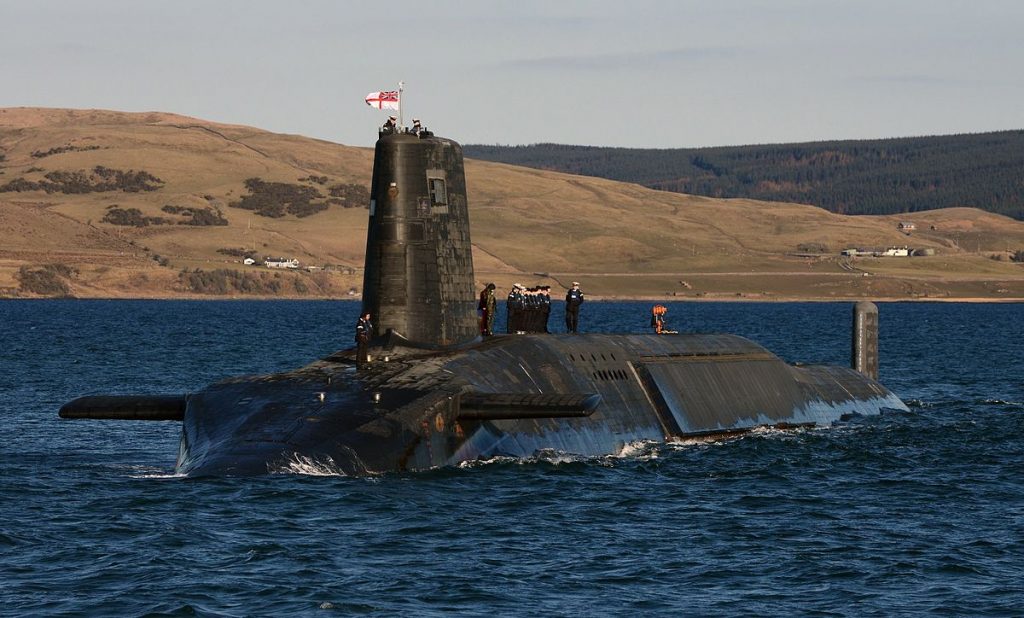
Financial Institutions in the UK Funding Nuclear Weapons
In addition to government contracts, financial institutions in the United Kingdom also play a significant role in sustaining the nuclear weapons industry. The most recent Don’t Bank on the Bomb report by PAX and ICAN highlights the billions invested by banks, pension funds, investment firms and asset managers, despite growing calls to advance the disarmament agenda.47
Between January 2022 and August 2024, 15 UK financial institutions were found to have direct financial ties to nuclear weapons producing companies. Of these, 11 financial institutions held $13.4 billion in shares and bonds and 5 provided $17.1 billion in loans and underwriting.48
By financially supporting these companies, the UK institutions on our target list are directly enabling the continued threat of nuclear weapons and global insecurity, while also diverting crucial resources away from healthcare, social and environmental needs.
The investments of the financial institutions in the target list have either been made by the institution themselves, or on behalf of third parties. Therefore, the financial institutions are listed at the group level, whilst the investment amounts include their subsidiaries.49
Banks
Barclays
According to its Defence and Security Statement, Barclays has an established policy detailing activities it has no appetite for.50 Whilst it prohibits providing any financial services to companies known to trade in, or manufacture, cluster munitions and their components, chemical and biological weapons, and landmines, in the case of the manufacture of, or trade in, nuclear weapons, it limits its prohibition to direct financing “where the use of proceeds is known to be for a particular project.”51 In this way, as brought to light by PAX and ICAN, Barclays has provided significant financial services to nuclear weapons producers through the indirect means of providing loans and underwriting.52
Between January 2018 and October 2020, Barclays made $6,286,200,000 available to nuclear weapons producers,53 increasing to $6,439,200,000 between January 2022 and August 2024, as shown below.54
As such, although Barclays restricts direct financing of nuclear weapons production, it continues to engage in indirect financial activities with companies involved in the nuclear weapons industry.
Barclays made a total of $4.966 billion in loans available to these nuclear weapons producers:
- $498 million to Airbus
- $106 million to Babcock
- $769 million to Boeing
- $696 million to Honeywell
- $191 million to Jacobs
- $257 million to L3Harris
- $118 million to Leonardo
- $420 million to Lockheed Martin
- $1.217 billion to Peraton
- $181 million to Rolls-Royce
- $350 million to RTX
- $163 million to Thales
Barclays made a total of $1.473 billion in underwriting available to these nuclear weapons producers:
- $112 million to Thales
- $218 million to BAE Systems
- $146 million to Boeing
- $103 million to Honeywell
- $20 million to Jacobs
- $578 million to Lockheed Martin
- $297 million to RTX
HSBC
HSBC’s Defence Equipment Policy Statement details their “restricted appetite for the defence sector,” prohibiting “the financing and provisions of advisory services to clients which manufacture, trade, purchase or sell weapons for military use,” including nuclear weapons.55
Despite their policy, HSBC has continued to engage in financing companies involved in the nuclear weapons industry by holding shares, and providing loans and underwriting, amounting to $3,503,000,000 between January 2022 and August 2024.56
HSBC made a total of $95 million in shares available to these nuclear weapons producers:
- $29 million in Bharat Dynamics
- $66 million in Huntington Ingalls Industries
HSBC made a total of $269 million in underwriting available to these nuclear weapons producers:
- $103 million to Honeywell
- $54 million to Jacobs
- $112 million to Thales
HSBC made a total of $3.139 billion in loans available to these nuclear weapons producers:
- $498 million to Airbus
- $106 million to Babcock
- $257 million to Bechtel
- $619 million to Honeywell
- $369 million to Jacobs
- $257 million to L3Harris
- $88 million to Leonardo
- $726 million to Rolls-Royce
- $219 million to Thales
Lloyds Banking Group
Lloyds Banking Group prohibits support for businesses engaged in activities forbidden by international conventions ratified by the UK, including cluster munitions, anti-personnel landmines, biological and toxin weapons, chemical weapons and permanent blinding laser weapons. However, as NPT nuclear weapons states, Lloyds Banking Group does support businesses engaging in activities related to the national nuclear weapons programmes of the UK, US and France.57
The institution has invested close to $2.5 billion in eight nuclear weapon producing companies through loans and underwriting of bond issuances between January 2022 and August 2024.58
Lloyds Banking Group made a total of $1.975 billion in loans available to these nuclear weapons producers:
- $424 million to Airbus
- $106 million to Babcock
- $402 million to Boeing
- $265 to General Dynamics
- $275 million to Lockheed Martin
- $52 million to Peraton
- $451 million to Rolls-Royce
Lloyds Banking Group made a total of $515 million in underwriting available to these nuclear weapons producers:
- $218 million to BAE Systems
- $146 million to Boeing
- $152 million to Lockheed Martin
NatWest
NatWest’s Environmental, Social, and Ethical (ESE) Risk Defence and Private Security Acceptance Criteria does not support customers or transactions involved in the financing of companies engaged in the manufacture, sale, trade, servicing, or stockpiling of nuclear weapons in jurisdictions outside NATO countries.59
However, this policy allows financing companies involved in nuclear weapons production within NATO countries with accredited programmes, namely the UK, US, or France.
NatWest has provided financial services to nuclear weapons producers within these parameters, with over $2.5 billion in loans and underwriting activities between January 2022 and August 2024 to seven nuclear weapon companies.60
NatWest made a total of $2.163 billion in loans available to these nuclear weapons producers:
- $394 million to Airbus
- $712 million to Babcock
- $619 million to Honeywell
- $235 million to Jacobs
- $88 million to Leonardo
- $115 million to Rolls-Royce
NatWest made a total of $341 million in underwriting available to these nuclear weapons producers:
- $218 million to BAE Systems
- $103 million to Honeywell
- $20 million to Jacobs
Standard Chartered
Standard Chartered has published policies regarding its involvement with nuclear weapon producing companies. Firstly, according to its Summary of Approach on Defence Goods, the bank will not provide direct financing for “anything designed to kill, maim or torture humans. This includes nuclear, chemical or biological weapons, cluster munitions and mines.”61 This is further reinforced by Standard Chartered’s Power Generation Position Statement, which states that the bank will only provide financial services to clients who “demonstrate that their operations do not contribute to the manufacture or distribution of nuclear weapons.”62
However, Standard Chartered applies a 20% threshold to annual turnover derived from “manufacturing, selling, brokering or supplying Defence Goods or services” when defining a defence company under its policies.63 Therefore, Standard Chartered does not apply its policies to all nuclear weapons producing companies, or those involved in joint ventures.64
Standard Chartered has provided $2,289,000,000 to the nuclear weapons industry between January 2022 and August 2024.65
Standard Chartered made a total of $2.017 billion in loans available to these nuclear weapons producers:
- $143 million to Airbus
- $478 million to Boeing
- $100 million to Fluor
- $619 million to Honeywell
- $513 million to Rolls-Royce
- $163 million to Thales
Standard Chartered made a total of $272 million in underwriting to these nuclear weapons producers:
- $146 million to Boeing
- $24 million to Fluor
- $103 million to Honeywell
Pension Funds
Legal and General
Legal and General’s Controversial Weapons Policy excludes investments in companies involved in the production of cluster munitions, antipersonnel landmines, and biological and chemical weapons. However, it also states that it does not include nuclear weapons in its exclusion policy as “their use is not prohibited within the ‘nuclear weapon states.’”68
- $27 million of bonds in Babcock
A total of $5.26 billion in shares:
- $38 million in Babcock
- $489 million in BAE Systems
- $625 million in Boeing
- $429 million in General Dynamics
- $1.049 billion in Honeywell
- $59 million in Huntington Ingalls Industries
- $113 million in Jacobs
- $265 million in L3Harris
- $135 million in Leidos
- $474 million in Northrop Grumman
- $603 million in Rolls-Royce
- $861 million in RTX
- $121 million in Textron
Royal London Group
Royal London Group offers a Sustainable Fund Range, however, its default pension fund does not have a policy excluding nuclear weapons or defence activities more broadly.69
- $58 million of bonds in Rolls-Royce
Investment Funds and Asset Managers
Baillie Gifford
Baillie Gifford has an exclusion policy which “seeks to avoid investment in holdings directly involved in producing controversial weapons, or the components or services that are essential to and tailor-made for them.” Whilst their definition of controversial weapons does include nuclear weapons, it only considers them controversial when they are in breach of the Treaty on the Non-Proliferation of Nuclear Weapons (NPT). Furthermore, its exclusion policy only applies to companies directly held in portfolios on behalf of Baillie Gifford’s clients.70
- $102 million of shares in Babcock
Children’s Investment Fund Management
Information on Children’s Investment Fund Management’s policies on investing in nuclear weapons or other controversial weapons is not readily available.
- $4.306 billion of shares in Safran
Janus Henderson
Janus Henderson applies firmwide exclusions to investments in companies which directly manufacture cluster munitions, anti-personnel mines, and chemical and biological weapons, or minority shareholders of 20% or more in such companies.71 However, Janus Henderson does not categorically exclude investments in companies involved in nuclear weapons production.
A total of $1.238 billion in shares:
- $793 million in Honeywell
- $445 million in L3Harris
Jupiter Fund Management
Jupiter Fund Management limits its investment exclusions only to companies who produce cluster munitions and anti-personnel mines.72
- $108 million of shares in Babcock
M&G
M&G applies an exclusion policy to controversial weapons. Whilst their definition of controversial weapons does include nuclear weapons, it only considers them controversial outside of the NPT.73
- $310 million of shares in BAE Systems
Marathon London
Marathon-London does not apply a formal exclusion policy, therefore does not explicitly prohibit its investments in any sector or activity. Rather, it employs a subjective Environmental, Social and Governance policy assessment as part of investment decisions. As such, Marathon-London does not have a policy on nuclear weapon investments.74
- $339 million of shares in Rolls-Royce
Schroders
Schroders limits its investment exclusions only to companies who are involved in the production, stockpiling, transfer and use of cluster munitions, anti-personnel mines, and chemical and biological weapons, also providing an exclusion list of companies involved in these weapons.75
- $45 million in Babcock
Silchester International Investors
Information on Silchester International Investors’ policies on investing in nuclear weapons or other controversial weapons is not readily available. However, in its UK Stewardship Code Statement, the firm states it has not agreed to any client specific investment restrictions when it comes to ESG matters, despite clients having felt passionately about a given issue, including disarmament and military funding.76
A total of $1.549 billion in shares:
- $120 million in Babcock
- $1.429 billion in BAE Systems
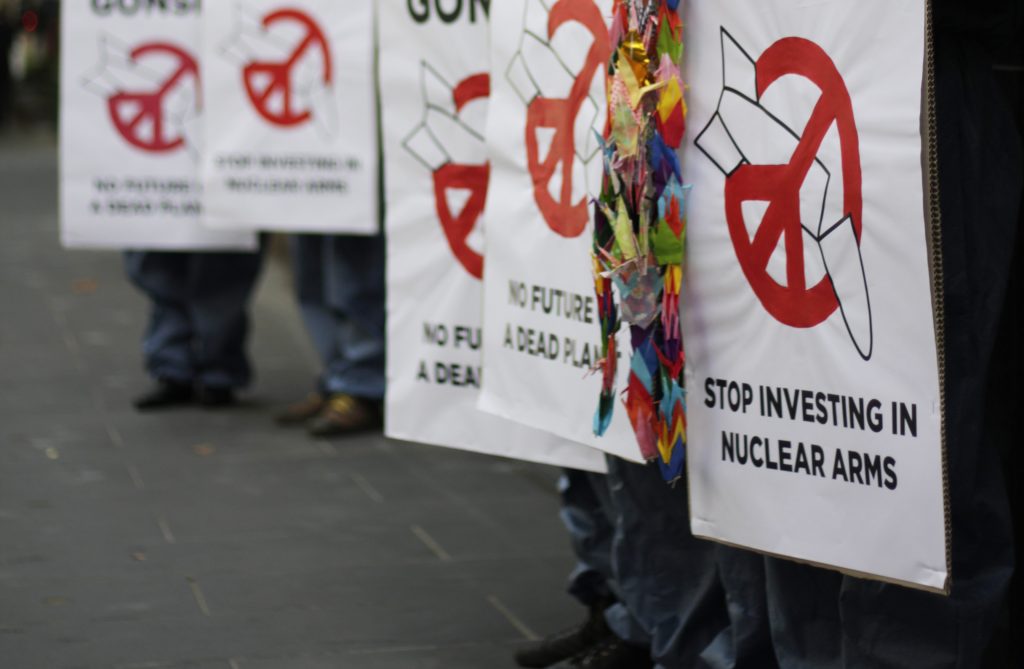
How to Write an Ethical Investment Policy Excluding All Investments in Nuclear Weapons
The term ‘controversial weapons’ is often used in investment and environmental, social and governance (ESG) policies to refer to certain types of weapons deemed to be indiscriminate or illegal by treaties under international law. Typically, controversial weapons include landmines, cluster munitions, and biological and chemical weapons. But, as illustrated above, nuclear weapons are frequently excluded from this category, despite being inherently indiscriminate and prohibited under the TPNW.
As it is not universally defined, the ambiguity of the term allows institutions to utilise this loophole to exclude nuclear weapons from any restrictions. As such, Don’t Bank on the Bomb UK recommend the consideration and application of the following steps for financial institutions to comprehensively exclude all controversial weapons, including nuclear weapons from investment policies:
1) State the moral, ethical and legal reasons you are adopting this policy, specifying the activities, services and products that will trigger divestment.
This policy reflects our commitment to ethical investment practices and the provisions of treaties under international law, including the Anti-Personnel Landmines Treaty (1997), the Convention on Cluster Munitions (2008), the Biological Weapons Convention (1975), the Chemical Weapons Convention (1977) and the Treaty on the Prohibition of Nuclear Weapons (2021) by excluding any financial support for companies and their subsidiaries involved in the development, production, testing, maintenance, or sale of all controversial weapons, including landmines, cluster munitions, and biological, chemical and nuclear weapons.
2) Define what encompasses the term ‘nuclear weapons.’
In accordance with our policy, ‘nuclear weapons’ will encompass the nuclear warheads themselves, as well as components, associated delivery systems, platforms, and the infrastructure and capabilities that support the development of nuclear weapons.
3) Specify what this policy will apply to, and that it will apply at the group level.
This policy applies to all direct investments, passive and externally managed funds, joint ventures, loans and underwriting at the group level.
4) Specify how investment opportunities will be assessed and what mechanisms are in place to monitor compliance.
All potential investments will be cross checked against our investment exclusion list OR undergo
rigorous checks to identify any direct or indirect engagement with activities, services, or products that will trigger divestment. Our investment portfolio will be reviewed biannually to ensure continued compliance.
5) Finally, ensure transparency by making your ethical investment policy and exclusion list publicly available and easily accessible on your website.
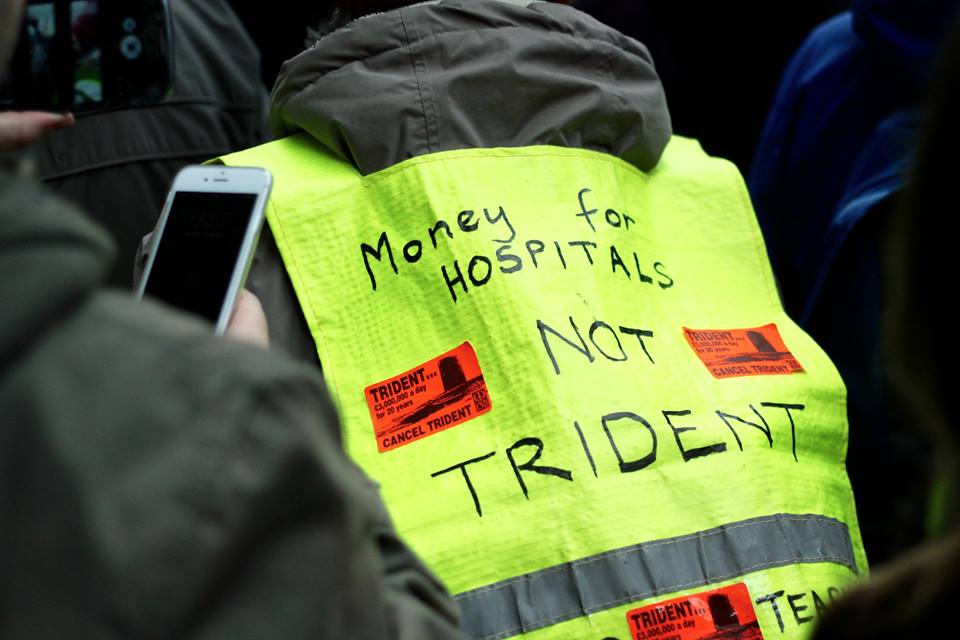
How to Take Action
Getting Financial Institutions to Divest
1) Research your financial institution
- Start by determining whether you are indirectly supporting the nuclear weapons industry by checking if your bank, pension scheme or investment fund features in our list of targets.
- At Don’t Bank on the Bomb we encourage you to engage in conversations with financial institutions to motivate change. Don’t divest without discussing!
2) Write to your financial institution
- Use our template to express your concerns about their investments in nuclear weapons.
- Share our ethical investment policy guide!
- Urge them to adopt a nuclear weapons free policy.
3) Use social media to pressure your financial institution to engage and act, using our hashtag #dontbankonthebomb.
Here are some example communications you can share on social media:
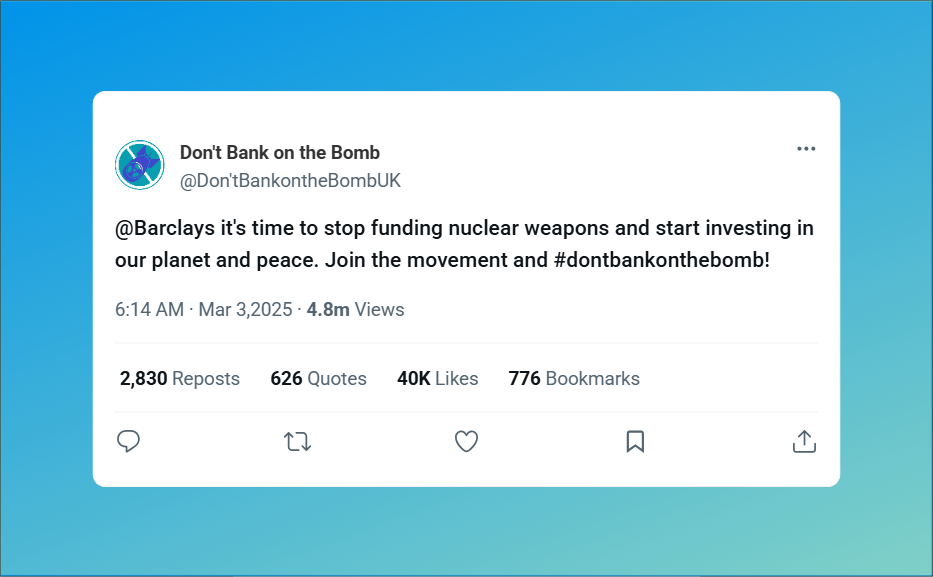
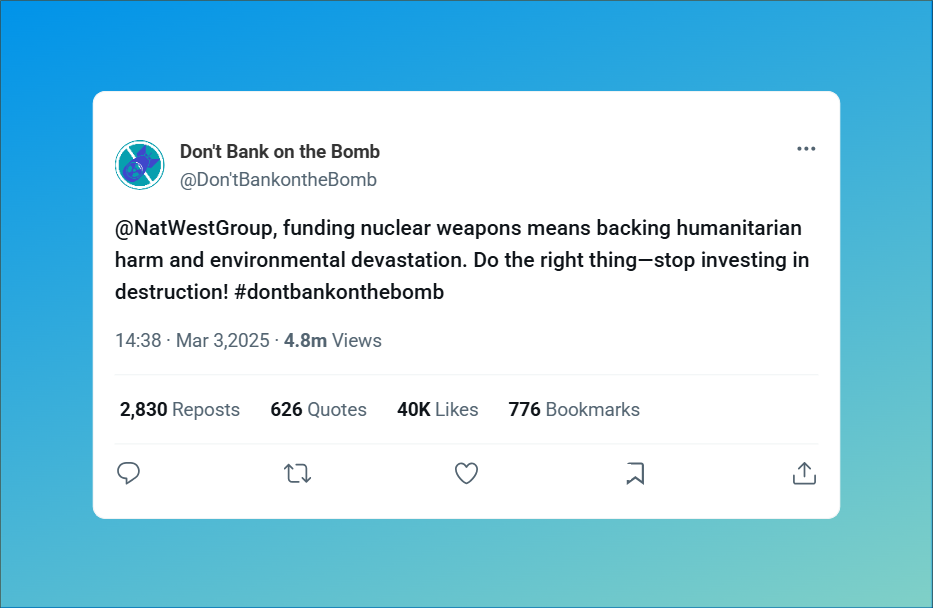
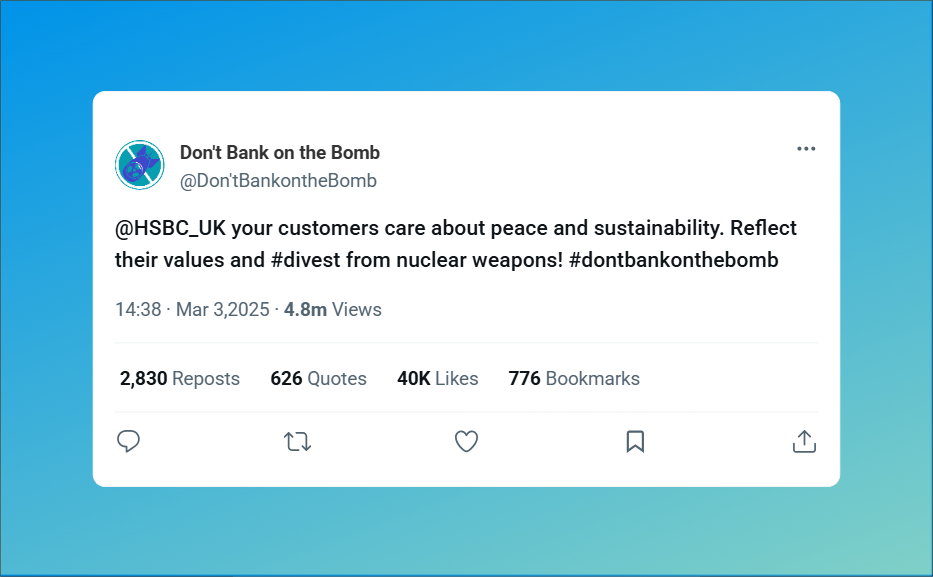
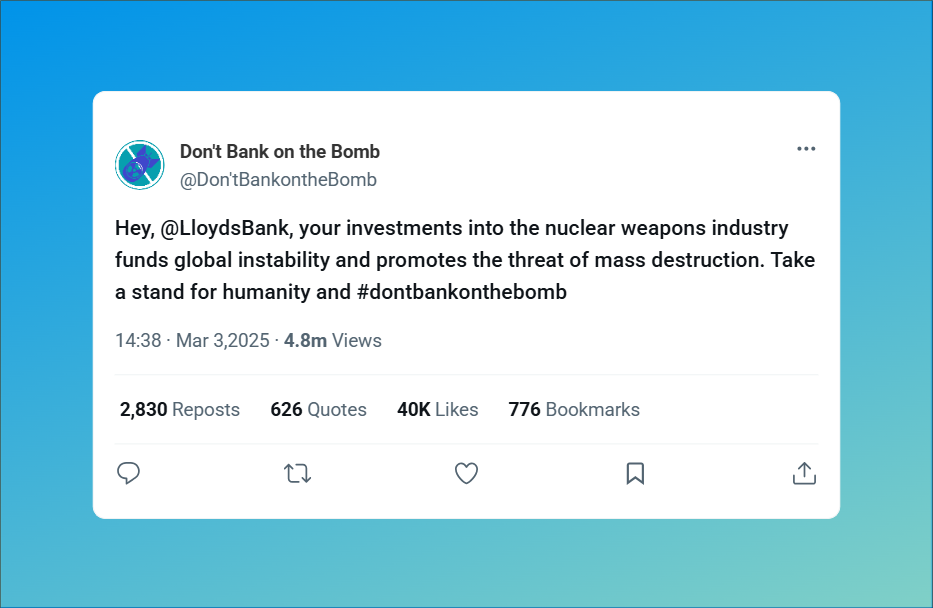
How to Make a Personal Divestment
If your financial institutions are featured in our list of targets and are investing in the nuclear weapons industry, you can of course take steps to personally divest and ensure you #dontbankonthebomb.
1) Write to your financial institution, using this template.
- State your objection and say you plan to change to a bank/pension/investment fund that does not invest in Nuclear Weapons.
2) Opt in for ethical investment options
- Some pension schemes, like Royal London Group and Nest, offer ethical policy options. Ask your provider to help you make the switch.
- Urge them to prioritise their ethical investment policy and offer it to customers as the default option.
3) Reinvest in ethical institutions listed in Don’t Bank on the Bomb’s Hall of Fame.
4) Share your financial move on social media, using the hashtag #DontBankOnTheBomb!
Here’s an example communication you can share with your financial institution on social media about your decision to divest:

Divesting Your Own Investments
By choosing to move your money and divest your investment portfolio from nuclear weapons, you can help reduce the financial support allowing these companies to continue compromising our global security. Here’s how to learn about your investments and divest your portfolio:
1) Ask your financial advisor
- If you work with a financial advisor, ask them to assess your investment portfolio for nuclear weapons-related investments and provide ethical investment options.
- Share our ethical investment guide as an example of policies you are looking to invest into.
2) Do it yourself! You can determine the nature of your investments by:
- Checking investment policies of investment management firms.
- Checking the fund prospectus.
- Using resources like weaponfreefunds.org (US), asyousow.org (US), uksif.org (UK) and ethicalconsumer.org (UK) to identify the nature of your investments.
Get Involved with Don’t Bank on the Bomb UK
In addition to actively divesting, there are many ways to take action and be part of the growing movement. Join Don’t Bank on the Bomb UK and become part of the national campaign advocating for nuclear divestment and ethical financing
- Sign up to the mailing list- Stay updated on campaign actions and events by signing up here.
- Attend a campaign meeting to connect with others and strategise on next steps.
- Spread the word by sharing our campaign leaflet and this toolkit with your networks.
- Join or collaborate with local campaigns- Connect with groups already using divestment strategies, such as the Palestine Solidarity Campaign, campaigning against banks investing in companies supplying weapons to Israel.
- Start your own campaign- Set up a local Don’t Bank on the Bomb group to advocate for divestment in your community.
- Raise public awareness by taking creative action:
> Organise public events, discussions, and talks to engage your community.
> Set up stalls outside bank branches to distribute information.
> Create posters, banners, and other visual materials.
> Use social media to amplify the message and encourage wider participation.
Don’t forget to let us know about your action! Share your divestment, communication, campaign and more by emailing [email protected].
Template Letter
Dear [ ],
I am writing to you as a customer of [name of institution] concerned about your institution’s involvement with nuclear weapon producing companies and the financing of these indiscriminate weapons of mass destruction.
The continued financing of nuclear weapons is neither ethically, morally or financially defensible. Whilst the ongoing threat of nuclear weapons undermines fundamental human rights and violates international law, the choice of your institution to invest in these indiscriminate weapons allows for the continuation of the climate chaos, environmental destruction and generational health impacts they cause. It is time to act upon the commitments of your corporate social responsibility (CSR) and environmental, social and governance (ESG) policies, and stop endangering current and coming generations. It is also time to align with international law and growing global norms.
Article VI of the Nuclear Non-Proliferation Treaty (NPT) binds nuclear-armed states to pursue disarmament in good faith- yet the United Kingdom continues to modernise its nuclear arsenal, in clear violation of its legal commitments. In addition, the Treaty on the Prohibition of Nuclear Weapons (TPNW) came into force in January 2021, making the financing and development of nuclear weapons illegal under international law.
Despite these legal obligations and the growing risks associated with nuclear weapon financing, [name of institution] provided [total amount] between 2022 and 2024 to the nuclear weapons producers who undermine the United Kingdom’s legal obligations and violate international law. This financial support for companies instigating global instability can no longer be ignored.
Your policies must be more robust in their position against nuclear weapons and go beyond the limited exclusion of direct financing and insufficient definitions of ‘controversial weapons.’ Comprehensive exclusions of all financial activity at a group level must also be implemented to ensure [name of institution] does not facilitate or support the production of nuclear weapons in any capacity.
Therefore, I call on you to commit to comprehensively exclude all controversial weapons, including nuclear weapons, ensuring that no part of your financial services- including direct investments, passive and externally managed funds, joint ventures, loans and underwriting- support the nuclear weapons industry.
I ask that my money not be used to fund nuclear weapons and that my request to divest be responded to.
I look forward to hearing from you.
Yours sincerely,
[your name]
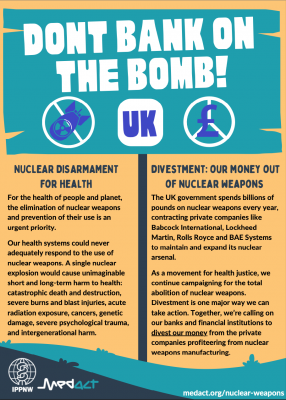
Endnotes
1 Muñoz, A., Snyder, S. & Oudes, C. (2024) Untenable Investments: nuclear weapon producers and their financiers. Available at: https://www.dontbankonthebomb.com/wp-content/uploads/2024/05/PAX_Rapport_DBotB_Untenable-Investments_HERDRUK_JUN24_FINAL_digi_spread.pdf (Accessed 16 March 2025)
2 Knight, R. (1990) ‘Sanctions, Divestment, and U.S. Corporations in South Africa,’ in R.E. Edgar (ed.) Sanctioning Apartheid. New Jersey: Africa World Press, Inc, pp.67-90.
3 Williamson, S. (2016) ‘Comprehensive Anti-Apartheid Act of 1986.’ The Congress Project, 06 April 2016. Available at: https://www.thecongressproject.com/comprehensive-antiapartheid-act-of-1986 (Accessed 16 March 2025).
4 Fossil Free UK. The Strength of the Divestment Movement. Available at: https://gofossilfree.org/uk/the-strength-of-the-divestment-movement/ (Accessed 16 March 2025).
5 Muñoz, A., Snyder, S. & Oudes, C. (2025) At Great Cost: The companies building nuclear weapons and their financiers. Available at: https://www.dontbankonthebomb.com/wp-content/uploads/2025/02/72025004_PAX_-_DONT-BANK-ON-THE-BOMB_FINAL_WEB.pdf (Accessed 16 March 2025)
6 Medact. (2017) A Safer World – Treating Britain’s harmful dependence on nuclear weapons. Available at: https://www.medact.org/2017/resources/reports/safer-world-treating-britains-harmful-dependence-nuclear-weapons/ (Accessed 16 March 2025).
7 Xia, L., Robock, A., Scherrer, K. et al. (2022) ‘Global food insecurity and famine from reduced crop, marine fishery and livestock production due to climate disruption from nuclear war soot injection.’ Nature Food, 3, pp.586–596.
8 Kristensen, H.M., Korda, M., Johns, E. & Knight, M. (2024) ‘United Kingdom nuclear weapons, 2024.’ Bulletin of the Atomic Scientists, 12 November 2024. Available at: https://thebulletin.org/premium/2024-11/united-kingdom-nuclear-weapons-2024/ (Accessed 16 March 2025).
9 Mills, C. (2024) ‘Replacing the UK’s Nuclear Deterrent: Progress of the Dreadnought Class.’ House of Commons Library, 02 August 2024. Available at: https://commonslibrary.parliament.uk/research-briefings/cbp-8010/ (Accessed 16 March 2025).
10 Pfeifer, S. (2022) ‘BAE Systems and Rolls-Royce win £2bn UK nuclear deterrent contracts.’ Financial Times, 10 May 2022. Available at: https://www.ft.com/content/5babc991-6c47-4e6a-afa9-2725c68cff4c (Accessed 16 March 2025).
11 Kristensen, H.M., Korda, M., Johns, E. & Knight, M. (2024) ‘United Kingdom nuclear weapons, 2024.’ Bulletin of the Atomic Scientists, 12 November 2024. Available at: https://thebulletin.org/premium/2024-11/united-kingdom-nuclear-weapons-2024/ (Accessed 16 March 2025).
12 Campaign for Nuclear Disarmament. Map of Nuclear Britain. Available at: https://cnduk.org/resources/nuclear-britain-map/ (Accessed 16 March 2025).
13 ICAN. TPNW signature and ratification status. Available at: https://www.icanw.org/signature_and_ratification_status (Accessed 16 March 2025).
14 Treaty on the Prohibition of Nuclear Weapons. (2021) Available at: https://d3n8a8pro7vhmx.cloudfront.net/tectodevms/pages/2417/attachments/original/1571248124/TPNW-English1.pdf?1571248124 (Accessed 16 March 2025).
15 Olsen, J. M. (2021) ‘Norway fund divests from companies tied to weapon production.’ Associated Press, 04 November 2021. Available at: https://apnews.com/article/technology-business-europe-middle-east-west-bank-4a86df6d4d911bb7876dc1b7f3767905 (Accessed 16 March 2025).
16 KBC. (2021) ‘KBC nuclear arms policy fully in line with UN Treaty on Prohibition of Nuclear Weapons.’ KBC Press release, 22 January 2021. Available at: https://www.kbc.com/content/dam/kbccom/doc/newsroom/pressreleases/2021/20210122_PB_VNverdrag_Kernwapens_ENG.pdf (Accessed 16 March 2025).
17 Deutsche Bank. (2019) Anti-nuclear weapons stance: Deutsche Bank’s policy receives seal of approval. Available at: https://www.db.com/news/detail/20191018-anti-nuclear-weapons-stance-deutsche-bank-s-policy-receives-seal-of-approval?language_id=1 (Accessed 16 March 2025).
18 Mills, C. (2024) ‘The cost of the UK’s strategic nuclear deterrent.’ House of Commons Library, 22 August 2024. Available at: https://commonslibrary.parliament.uk/research-briefings/cbp-8166/ (Accessed 16 March 2025).
19 Cullen, D. (2024) ‘UK nuclear weapons spending rises to £6.5bn.’ Nuclear Information Service, 20 June 2024. Available at: https://www.nuclearinfo.org/comment/2024/06/uk-nuclear-weapons-spending-rises-to-6-5bn/ (Accessed 16 March 2025).
20 Stockholm International Peace Research Institute (2024) ‘Global military spending surges amid war, rising tensions and insecurity.’ Stockholm International Peace Research Institute. Available at: https://www.sipri.org/media/press-release/2024/global-military-spending-surges-amid-war-rising-tensions-and-insecurity (Accessed 16 March 2025).
21 Prime Minister’s Office, 10 Downing Street (2025) Press release: Prime Minister sets out biggest sustained increase in defence spending since the Cold War, protecting British people in new era for national security. Available at: https://www.gov.uk/government/news/prime-minister-sets-out-biggest-sustained-increase-in-defence-spending-since-the-cold-war-protecting-british-people-in-new-era-for-national-security (Accessed 16 March 2025).
22 Norton-Taylor, R. (2024) ‘Britain spends £12,000 a minute on nuclear weapons.’ Declassified UK. Available at: https://www.declassifieduk.org/britain-spends-12000-a-minute-on-nuclear-weapons/ (Accessed 16 March 2025).
23 Mills, C. & Kirk-Wade, E. (2025) ‘The cost of the UK’s strategic nuclear deterrent.’ House of Commons Library, 12 August 2025. Available at: https://commonslibrary.parliament.uk/research-briefings/cbp-8166/ (Accessed 27 August 2025).
24 Fund Our NHS. 9 effects of underfunding. Available at: https://nhsfunding.info/symptoms/10-effects-of-underfunding/ (Accessed 16 March 2025).
25 Save the Children, Child Poverty in the UK. Available at: https://www.savethechildren.org.uk/what-we-do/child-poverty/uk-child-poverty (Accessed 16 March 2025).
26 Crisis (2025) Third successive rise in rough sleeping as the homelessness crisis deepens across England, 27 February 2025. Available at: https://www.crisis.org.uk/about-us/crisis-media-centre/third-successive-rise-in-rough-sleeping-as-the-homelessness-crisis-deepens-across-england/ (Accessed 16 March 2025).
27 Trussell. End of year food bank stats. Available at: https://www.trussell.org.uk/news-and-research/latest-stats/end-of-year-stats (Accessed 16 March 2025).
28 Cooke, M. (2025) ‘Starmer braces for rebellion over welfare cuts as Labour accused of ‘pushing disabled people into poverty’.’ Independent, 10 March 2025. Available at: https://www.independent.co.uk/news/uk/politics/welfare-cuts-labour-starmer-rebellion-b2712095.html (Accessed 16 March 2025).
29 Prime Minister’s Office, 10 Downing Street (2025) Press release: Prime Minister sets out biggest sustained increase in defence spending since the Cold War, protecting British people in new era for national security. Available at: https://www.gov.uk/government/news/prime-minister-sets-out-biggest-sustained-increase-in-defence-spending-since-the-cold-war-protecting-british-people-in-new-era-for-national-security (Accessed 16 March 2025).
30 Kirk-Wade, E. (2024) ‘Hospital building in England: Plans and progress.’ House of Commons Library, 21 February 2024. Available at: https://commonslibrary.parliament.uk/hospital-building-in-england-plans-and-progress/ (Accessed 16 March 2025).
31 The King’s Fund (2024) Key facts and figures about the NHS, 25 June 2024. Available at: https://www.kingsfund.org.uk/insight-and-analysis/data-and-charts/key-facts-figures-nhs (Accessed 16 March 2025).
32 University College London (2023) Building more social and affordable housing could save UK government £1.5 billion a year, 4 October 2023. Available at: https://www.ucl.ac.uk/news/2023/oct/building-more-social-and-affordable-housing-could-save-uk-government-ps15-billion-year (Accessed 16 March 2025).
33 Arms Control Association (2024) Nuclear Testing Tally. Available at: https://www.armscontrol.org/factsheets/nuclear-testing-tally (Accessed 16 March 2025).
34 Unal, B., Lewis, P. & Aghlani, S. (2017) The Humanitarian Impacts of Nuclear Testing: Regional Responses and Mitigation Measures. London: Chatham House.
35 Pearson, L. (2020) Nuclear Weapons, the Climate and Our Environment: Working towards a just, sustainable and peaceful future. Don’t Bank on the Bomb Scotland. Available at: https://nukedivestmentscotland.org/wp-content/uploads/2020/08/nwce-report-final-1.pdf (Accessed 16 March 2025).
36 Ibid.
37 BBC News (2001) ‘Servicemen exposed to radiation.’ BBC News, 12 May 2001. Available at: http://news.bbc.co.uk/1/hi/uk/1326410.stm (Accessed 16 March 2025).
38 Seale, J. (2024) ‘Britain’s Nuclear Bomb Scandal: Our Story review- how the UK’s atomic testing programme devastated lives.’ The Guardian, 20 November 2024. Available at: https://www.theguardian.com/tv-and-radio/2024/nov/20/britain-nuclear-bomb-scandal-our-story-review (Accessed 16 March 2025).
39 Parkinson, S. (2020) The Environmental Impacts of the UK Military Sector. Scientists for Global Responsibility & Declassified UK. Available at: https://www.sgr.org.uk/sites/default/files/2020-05/SGR-DUK_UK_Military_Env_Impacts.pdf (Accessed 16 March 2025).
40 Ibid.
41 BBC News (2013) ‘AWE atomic weapons site leaks tritium gas into stream.’ BBC News, 14 October 2013. Available at: https://www.bbc.com/news/uk-england-berkshire-24518372 (Accessed 16 March 2025).
42 Pearson, L. (2020) Nuclear Weapons, the Climate and Our Environment: Working towards a just, sustainable and peaceful future. Don’t Bank on the Bomb Scotland. Available at: https://nukedivestmentscotland.org/wp-content/uploads/2020/08/nwce-report-final-1.pdf (Accessed 16 March 2025).
43 Irish Times (2023) ‘Sellafield nuclear site has leak that could have ‘potentially significant consequences’, Guardian reports.’ Irish Times, 05 December 2023. Available at: https://www.irishtimes.com/world/uk/2023/12/05/sellafield-nuclear-site-has-leak-that-could-have-potentially-significant-consequences-guardian-reports/ (Accessed 16 March 2025).
44 ICAN (2020) ‘The Environmental Legacy of Nuclear Weapons Production: Five Case Studies.’ ICAN, 22 April 2020. Available at: https://www.icanw.org/the_environmental_legacy_of_nuclear_production_five_case_studies (Accessed 16 March 2025).
45 Irish Times (2023) ‘Sellafield nuclear site has leak that could have ‘potentially significant consequences’, Guardian reports.’ Irish Times, 05 December 2023. Available at: https://www.irishtimes.com/world/uk/2023/12/05/sellafield-nuclear-site-has-leak-that-could-have-potentially-significant-consequences-guardian-reports/ (Accessed 16 March 2025).
46 BBC News (2024) ‘Nuclear plant radioactive leak ‘slowing down’’ BBC News, 17 September 2024. Available at: https://www.bbc.com/news/articles/c7v6646l9emo (Accessed 16 March 2025).
47 Muñoz, A., Snyder, S. & Oudes, C. (2025) At Great Cost: The companies building nuclear weapons and their financiers. Available at: https://www.dontbankonthebomb.com/wp-content/uploads/2025/02/72025004_PAX_-_DONT-BANK-ON-THE-BOMB_FINAL_WEB.pdf (Accessed 16 March 2025).
48 Note: Financial figures are presented in USD to ensure consistency and comparability with the original source material.
49 Ibid.
50 Barclays (2023) Defence and Security Statement. Available at: https://home.barclays/content/dam/home-barclays/documents/citizenship/our-reporting-and-policy-positions/policy-positions/Barclays-Statement-on-the-Defence-Sector.pdf (Accessed on 16 March 2025).
51 Ibid.
52 Muñoz, A., Snyder, S. & Oudes, C. (2025) At Great Cost: The companies building nuclear weapons and their financiers. Available at: https://www.dontbankonthebomb.com/wp-content/uploads/2025/02/72025004_PAX_-_DONT-BANK-ON-THE-BOMB_FINAL_WEB.pdf (Accessed 16 March 2025).
53 Snyder, S. (2021) Perilous Profiteering: The companies building nuclear arsenals and their financial backers. Available at: https://d3n8a8pro7vhmx.cloudfront.net/ican/pages/2331/attachments/original/1637141262/2021_Perilous_Profiteering_Final.pdf?1637141262 (Accessed 16 March 2025).
54 Muñoz, A., Snyder, S. & Oudes, C. (2025) At Great Cost: The companies building nuclear weapons and their financiers. Available at: https://www.dontbankonthebomb.com/wp-content/uploads/2025/02/72025004_PAX_-_DONT-BANK-ON-THE-BOMB_FINAL_WEB.pdf (Accessed 16 March 2025).
55 HSBC (n.d.) Defence Equipment Policy Statement. Available at: https://www.hsbc.com/-/files/hsbc/our-approach/risk-and-responsibility/pdfs/240628-defence-equipment-policy-statement.pdf?download=1 (Accessed 16 March 2025).
56 Muñoz, A., Snyder, S. & Oudes, C. (2025) At Great Cost: The companies building nuclear weapons and their financiers. Available at: https://www.dontbankonthebomb.com/wp-content/uploads/2025/02/72025004_PAX_-_DONT-BANK-ON-THE-BOMB_FINAL_WEB.pdf (Accessed 16 March 2025).
57 Lloyds Banking Group (2019) Defence Sector Statement. Available at: https://www.banktrack.org/download/defence_sector_statement/190415_defence_sector_statement_jan2019.pdf (Accessed 16 March 2025).
58 Muñoz, A., Snyder, S. & Oudes, C. (2025) At Great Cost: The companies building nuclear weapons and their financiers. Available at: https://www.dontbankonthebomb.com/wp-content/uploads/2025/02/72025004_PAX_-_DONT-BANK-ON-THE-BOMB_FINAL_WEB.pdf (Accessed 16 March 2025).
59 NatWest (2025). Environmental, Social and Ethical Risk Defence and Private Security Acceptance Criteria. Available at: https://www.natwestgroup.com/content/dam/natwestgroup_com/natwestgroup/Docs/web-pages/2025/sustainability/NWG-2025-ESE-Defence-Private-Security.pdf.coredownload.pdf (Accessed 16 March 2025).
60 Muñoz, A., Snyder, S. & Oudes, C. (2025) At Great Cost: The companies building nuclear weapons and their financiers. Available at: https://www.dontbankonthebomb.com/wp-content/uploads/2025/02/72025004_PAX_-_DONT-BANK-ON-THE-BOMB_FINAL_WEB.pdf (Accessed 16 March 2025).
61 Standard Chartered (N.d). Summary of Approach on Defence Goods. Available at: https://www.banktrack.org/download/summary_of_approach_on_defence_goods/190805_defencesummaryofapproachondefencegoods.pdf (Accessed 16 March 2025).
62 Standard Chartered (2024) Power Generation Position Statement. Available at: https://www.banktrack.org/download/power_generation_position_statement_6/240226_standard_chartered_powergenerationpositionstatement.pdf (Accessed 16 March 2025).
63 Standard Chartered (N.d.) Summary of Approach on Defence Goods. Available at: https://www.banktrack.org/download/summary_of_approach_on_defence_goods/190805_defencesummaryofapproachondefencegoods.pdf (Accessed 16 March 2025).
64 Muñoz, A. (2023) Moving Away from Mass Destruction: 109 exclusions of nuclear weapon producers. Available at: https://www.dontbankonthebomb.com/wp-content/uploads/2023/07/PAX_Rapport_DBotB_Moving_Away_FINAL_digi_Single_Page.pdf (Accessed 16 March 2025).
65 Muñoz, A., Snyder, S. & Oudes, C. (2025) At Great Cost: The companies building nuclear weapons and their financiers. Available at: https://www.dontbankonthebomb.com/wp-content/uploads/2025/02/72025004_PAX_-_DONT-BANK-ON-THE-BOMB_FINAL_WEB.pdf (Accessed 16 March 2025).
66 Ibid.
67 For more information on the Hall of Fame and the ethical policies of banks see Muñoz, A. (2023) Moving Away from Mass Destruction: 109 exclusions of nuclear weapon producers. Available at: https://www.dontbankonthebomb.com/wp-content/uploads/2023/07/PAX_Rapport_DBotB_Moving_Away_FINAL_digi_Single_Page.pdf & Bank Track. Available at: www.banktrack.org
68 Legal and General (2020) LGIM (H) Controversial Weapons Policy. Available at: https://cms.lgim.com/globalassets/lgim/_document-library/capabilities/lgimh-controversial-weapons-policy.pdf (Accessed 16 March 2025).
69 Investing in Change. Take Action: Royal London. Available at: https://investinginchange.uk/action/royallondon/ (Accessed 16 March 2025).
70 Baillie Gifford (2024) Exclusion Policy. Available at: https://www.bailliegifford.com/en/global/existing-investors/literature-library/corporate-governance/exclusion-policy/ (Accessed 16 March 2025).
71 Janus Henderson Investors (2024) Responsible Investment Policy. Available at: https://cdn.janushenderson.com/webdocs/2024%2520Responsible%2520Investment%2520Policy.pdf (Accessed 16 March 2025).
72 Jupiter Fund Management (2024) Responsible Investment Policy. Available at: https://www.jupiteram.com/global/en/corporate/sustainability-at-jupiter/reports/#accordion-81e38ffbd7-item-8a94cf2c35 (Accessed 16 March 2025).
73 M&G Investments (2024) Controversial Weapons Policy. Available at: https://www.mandg.com/~/media/Files/M/MandG-Plc/documents/mandg-investments-policies/2024/mg-investments-controversial-weapons-policy04-24.pdf (Accessed 16 March 2025).
74 Marathon (2024) Environmental, Social and Governance Policy. Available at: https://www.marathon.co.uk/media/iorjymho/esg-policy.pdf (Accessed 16 March 2025).
75 Schroders (N.d.) Group Exclusions. Available at: https://www.schroders.com/en-gb/uk/individual/what-we-do/sustainable-investing/our-sustainable-investment-policies-disclosures-voting-reports/group-exclusions/ (Accessed 16 March 2025).
76 Silchester International Investors LLP (2025) UK Stewardship Code Statement. Available at: https://www.silchester.com/pdfs/Stewardship%20Code%20and%20Proxy%20Voting%20Policy%20-%200125.pdf (Accessed 16 March 2025).
